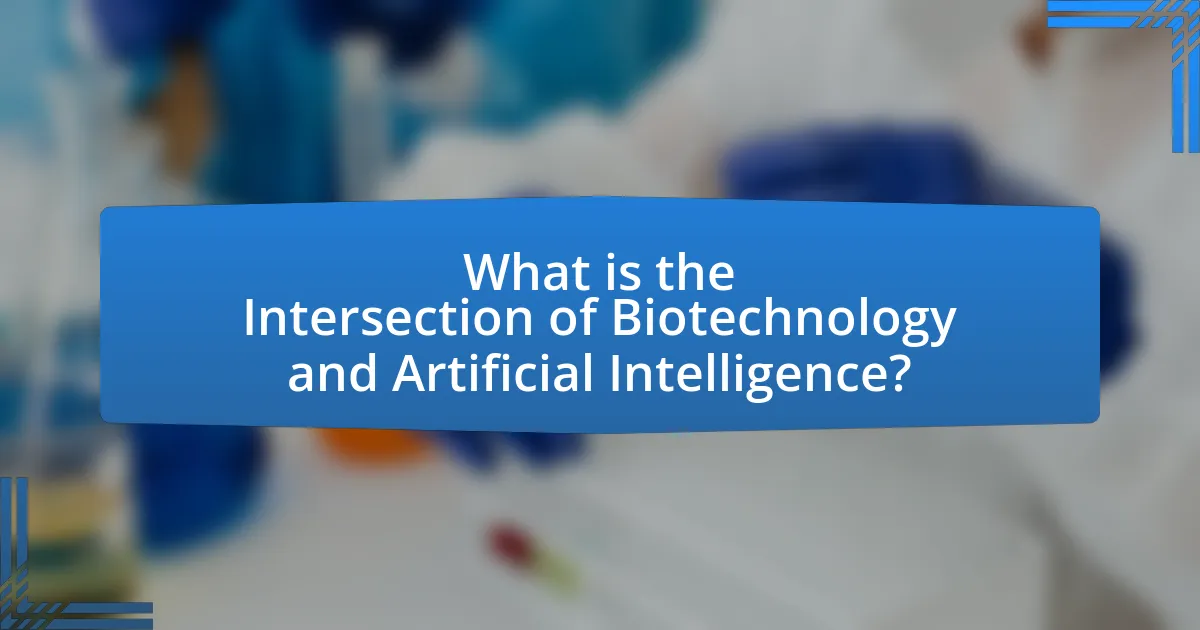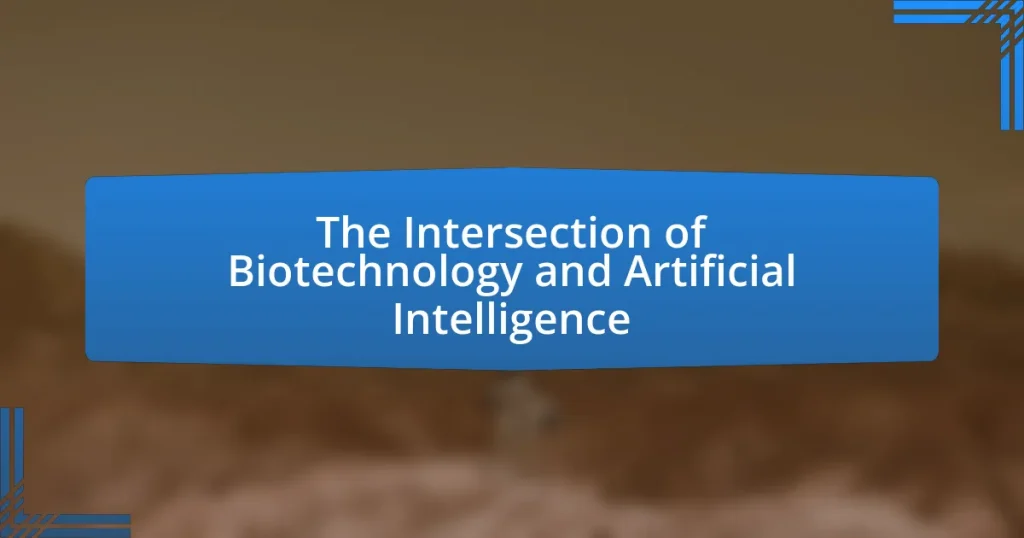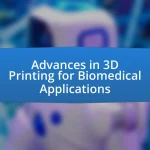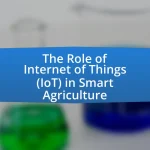The article explores the intersection of biotechnology and artificial intelligence, highlighting how AI technologies enhance biotechnological processes such as drug discovery, genetic engineering, and personalized medicine. It discusses the complementary relationship between these fields, emphasizing AI’s role in data analysis, predictive modeling, and the acceleration of research and innovation. Key technologies benefiting from AI include genomics, drug discovery, and synthetic biology, while ethical considerations and regulatory frameworks are also examined. The article outlines future trends and best practices for integrating AI in biotechnological research, underscoring the transformative potential of this synergy in healthcare and agriculture.

What is the Intersection of Biotechnology and Artificial Intelligence?
The intersection of biotechnology and artificial intelligence involves the integration of AI technologies to enhance biotechnological processes, such as drug discovery, genetic engineering, and personalized medicine. AI algorithms analyze vast datasets from biological research, enabling faster identification of potential drug candidates and optimizing genetic modifications. For instance, a study published in Nature Biotechnology demonstrated that machine learning models could predict protein structures with high accuracy, significantly accelerating the development of new therapeutics. This synergy not only improves efficiency but also fosters innovation in the life sciences, leading to breakthroughs in healthcare and agriculture.
How do Biotechnology and Artificial Intelligence complement each other?
Biotechnology and Artificial Intelligence complement each other by enhancing data analysis and decision-making processes in biological research and healthcare. Biotechnology generates vast amounts of biological data, such as genomic sequences and protein structures, while Artificial Intelligence algorithms can analyze this data efficiently, identifying patterns and making predictions that would be difficult for humans to discern. For instance, AI-driven tools like DeepMind’s AlphaFold have revolutionized protein folding predictions, significantly advancing drug discovery and development. This synergy accelerates innovation in personalized medicine, diagnostics, and agricultural biotechnology, ultimately leading to improved health outcomes and sustainable practices.
What are the key technologies in Biotechnology that benefit from AI?
Key technologies in Biotechnology that benefit from AI include genomics, drug discovery, personalized medicine, and synthetic biology. Genomics utilizes AI for analyzing large datasets to identify genetic variations linked to diseases, enhancing precision in diagnostics and treatments. Drug discovery leverages AI algorithms to predict molecular interactions and optimize compound selection, significantly reducing the time and cost associated with bringing new drugs to market. Personalized medicine employs AI to tailor treatments based on individual genetic profiles, improving patient outcomes. Synthetic biology integrates AI to design and construct new biological parts and systems, facilitating innovations in bioengineering. These technologies demonstrate the transformative impact of AI in advancing biotechnological applications.
How does AI enhance data analysis in Biotechnology?
AI enhances data analysis in biotechnology by enabling faster and more accurate interpretation of complex biological data. Machine learning algorithms can analyze vast datasets, such as genomic sequences and protein structures, identifying patterns and correlations that would be difficult for humans to detect. For instance, AI-driven tools like DeepMind’s AlphaFold have revolutionized protein folding predictions, achieving accuracy levels that surpass traditional methods. This capability accelerates drug discovery and personalized medicine by allowing researchers to predict how biological systems respond to various treatments, ultimately leading to more effective therapies.
What are the historical developments leading to this intersection?
The historical developments leading to the intersection of biotechnology and artificial intelligence include advancements in genetic engineering, the rise of computational biology, and the evolution of machine learning techniques. In the 1970s, the advent of recombinant DNA technology allowed scientists to manipulate genetic material, laying the groundwork for modern biotechnology. By the 1990s, the completion of the Human Genome Project provided vast amounts of genetic data, which necessitated computational tools for analysis. Concurrently, the development of machine learning algorithms in the late 20th century enabled the processing of complex biological data, facilitating predictive modeling in drug discovery and genomics. These milestones collectively created a fertile environment for the integration of AI into biotechnological applications, enhancing research capabilities and accelerating innovation in the field.
How has Biotechnology evolved with the introduction of AI?
Biotechnology has evolved significantly with the introduction of AI, enhancing research efficiency and precision in various applications. AI algorithms analyze vast datasets, enabling faster drug discovery and personalized medicine by predicting molecular interactions and patient responses. For instance, a study published in Nature Biotechnology in 2020 demonstrated that AI could reduce the time required for drug development by up to 50%. Additionally, AI-driven tools like CRISPR-Cas9 have improved gene editing accuracy, allowing for more targeted therapies. This integration of AI into biotechnology not only accelerates innovation but also increases the potential for breakthroughs in treating complex diseases.
What milestones mark the integration of AI in Biotechnological research?
Key milestones marking the integration of AI in biotechnological research include the development of machine learning algorithms for genomic data analysis, the use of AI in drug discovery, and the implementation of AI-driven predictive models for protein folding. In 2012, the introduction of deep learning techniques significantly advanced genomic sequencing analysis, enabling faster and more accurate interpretations of genetic data. In 2018, AI systems like Atomwise demonstrated their capability in drug discovery by predicting molecular interactions, leading to the identification of potential therapeutic compounds. Furthermore, in 2020, DeepMind’s AlphaFold achieved a breakthrough in predicting protein structures, which is crucial for understanding biological functions and developing new treatments. These milestones illustrate the transformative impact of AI on enhancing efficiency and accuracy in biotechnological research.
What are the ethical considerations at this intersection?
The ethical considerations at the intersection of biotechnology and artificial intelligence include issues of consent, privacy, and potential misuse of technology. Consent is crucial as individuals must be informed about how their genetic data may be used by AI systems, which can analyze and interpret this data for various applications. Privacy concerns arise from the collection and storage of sensitive biological information, raising questions about data security and ownership. Additionally, the potential for AI to be used in ways that could exacerbate inequalities or lead to discrimination in healthcare and genetic engineering highlights the need for ethical guidelines and regulatory frameworks to ensure responsible use of these technologies.
How do ethical concerns shape the application of AI in Biotechnology?
Ethical concerns significantly shape the application of AI in biotechnology by influencing regulatory frameworks, research priorities, and public acceptance. These concerns include issues related to privacy, consent, and potential biases in AI algorithms, which can affect how biotechnological innovations are developed and implemented. For instance, the use of AI in genetic editing raises questions about the ethical implications of altering human DNA, leading to calls for stringent guidelines and oversight. Additionally, studies have shown that public perception of AI in healthcare is heavily influenced by ethical considerations, with surveys indicating that individuals are more likely to support AI applications that prioritize transparency and fairness. Thus, ethical concerns not only guide the responsible use of AI in biotechnology but also impact its advancement and societal integration.
What regulations exist to govern the use of AI in Biotechnological innovations?
Regulations governing the use of AI in biotechnological innovations include the General Data Protection Regulation (GDPR) in Europe, which mandates data protection and privacy for individuals, impacting how AI systems handle personal data in biotech applications. Additionally, the Food and Drug Administration (FDA) in the United States oversees the approval of AI-driven medical devices and software, ensuring they meet safety and efficacy standards before market entry. The European Medicines Agency (EMA) also provides guidelines for AI applications in drug development and clinical trials, emphasizing transparency and accountability. These regulations collectively aim to ensure ethical use, data protection, and safety in the integration of AI within biotechnology.
How does the intersection of Biotechnology and Artificial Intelligence impact healthcare?
The intersection of Biotechnology and Artificial Intelligence significantly enhances healthcare by improving diagnostics, personalizing treatment plans, and accelerating drug discovery. For instance, AI algorithms analyze vast datasets from genomic sequencing to identify disease markers, leading to earlier and more accurate diagnoses. A study published in Nature Biotechnology demonstrated that AI-driven models could predict patient responses to specific therapies with over 90% accuracy, showcasing the potential for tailored treatments. Additionally, AI accelerates drug discovery processes by simulating molecular interactions, reducing the time and cost associated with bringing new drugs to market. This integration ultimately leads to more effective healthcare solutions and improved patient outcomes.
What are the applications of AI in drug discovery and development?
AI is applied in drug discovery and development primarily for predictive modeling, data analysis, and automation of laboratory processes. Predictive modeling utilizes machine learning algorithms to identify potential drug candidates by analyzing biological data, which accelerates the identification of compounds that may be effective against specific diseases. Data analysis involves processing vast datasets from genomics, proteomics, and clinical trials to uncover insights that inform drug design and optimize clinical trial designs. Automation of laboratory processes through AI-driven robotics enhances efficiency and accuracy in drug testing and synthesis. For instance, a study published in Nature Reviews Drug Discovery highlighted that AI can reduce the time and cost of drug development by up to 30%, demonstrating its significant impact on the pharmaceutical industry.
How does AI improve personalized medicine through Biotechnological advancements?
AI enhances personalized medicine by analyzing vast datasets to identify individual patient characteristics and treatment responses. Through biotechnological advancements, AI algorithms can process genomic data, enabling the identification of specific biomarkers associated with diseases. For instance, AI-driven tools like IBM Watson have demonstrated the ability to analyze genetic information and recommend tailored treatment plans, improving patient outcomes. Additionally, machine learning models can predict how patients will respond to certain therapies based on their unique biological profiles, leading to more effective and targeted interventions. This integration of AI in biotechnology not only streamlines drug discovery but also optimizes treatment protocols, ultimately advancing the field of personalized medicine.
What are the future trends in Biotechnology and Artificial Intelligence?
Future trends in Biotechnology and Artificial Intelligence include the integration of AI in drug discovery, personalized medicine, and genomics. AI algorithms are increasingly used to analyze vast datasets, leading to faster identification of potential drug candidates and more effective treatment plans tailored to individual genetic profiles. For instance, AI-driven platforms like Atomwise utilize deep learning to predict molecular interactions, significantly reducing the time and cost associated with traditional drug development processes. Additionally, advancements in CRISPR technology, combined with AI, enhance gene editing precision, allowing for targeted therapies in genetic disorders. These trends indicate a transformative shift in how biotechnology leverages AI to improve healthcare outcomes and streamline research methodologies.
How might AI-driven Biotechnological innovations change the landscape of agriculture?
AI-driven biotechnological innovations will significantly transform agriculture by enhancing crop yields, improving pest resistance, and optimizing resource use. These innovations leverage machine learning algorithms to analyze vast datasets, enabling precise predictions about plant growth and environmental conditions. For instance, AI can identify genetic traits associated with drought resistance, allowing for the development of crops that require less water, which is crucial in regions facing water scarcity. Additionally, AI-powered tools can monitor crop health in real-time, facilitating timely interventions that reduce pesticide use and increase sustainability. Research from the International Food Policy Research Institute indicates that integrating AI with biotechnology could increase global agricultural productivity by up to 30% by 2030, demonstrating the potential for these technologies to reshape the agricultural landscape.
What role will AI play in the future of genetic engineering?
AI will play a transformative role in the future of genetic engineering by enhancing precision in gene editing, accelerating research, and enabling personalized medicine. Machine learning algorithms can analyze vast datasets to identify genetic variations linked to diseases, improving the accuracy of CRISPR and other gene-editing technologies. For instance, AI-driven tools like DeepVariant have demonstrated the ability to accurately call genetic variants from sequencing data, achieving higher accuracy than traditional methods. Additionally, AI can optimize the design of genetic constructs, predict the effects of genetic modifications, and streamline the drug discovery process, ultimately leading to more effective therapies tailored to individual genetic profiles.
What are the best practices for integrating AI in Biotechnological research?
The best practices for integrating AI in biotechnological research include ensuring data quality, fostering interdisciplinary collaboration, and implementing robust ethical guidelines. High-quality data is crucial as AI algorithms rely on accurate and comprehensive datasets to produce reliable results; for instance, genomic data must be meticulously curated to avoid biases in machine learning models. Interdisciplinary collaboration between biologists, data scientists, and ethicists enhances the development of AI applications that are scientifically sound and socially responsible. Furthermore, establishing ethical guidelines is essential to address concerns related to data privacy and the implications of AI-driven decisions in biotechnology, as highlighted by the European Commission’s guidelines on AI ethics. These practices collectively enhance the effectiveness and integrity of AI applications in biotechnological research.
How can researchers ensure data integrity when using AI in Biotechnology?
Researchers can ensure data integrity when using AI in Biotechnology by implementing robust data validation protocols and employing secure data management practices. These protocols include regular audits of data sources, ensuring that datasets are accurate, complete, and consistent. Additionally, utilizing encryption and access controls protects sensitive data from unauthorized alterations. A study published in the journal “Nature Biotechnology” highlights that employing machine learning algorithms with built-in error detection can further enhance data integrity by identifying anomalies in datasets. This combination of validation, security measures, and advanced AI techniques establishes a reliable framework for maintaining data integrity in biotechnological research.
What strategies can organizations adopt to foster collaboration between AI and Biotechnology experts?
Organizations can foster collaboration between AI and Biotechnology experts by implementing interdisciplinary teams that combine expertise from both fields. This approach encourages knowledge sharing and innovation, as team members bring diverse perspectives and skills to problem-solving. For instance, companies like Ginkgo Bioworks have successfully integrated AI into their biotechnology processes by creating cross-functional teams that include data scientists, biologists, and engineers, leading to advancements in synthetic biology. Additionally, organizations can establish joint research initiatives and partnerships with academic institutions, which have been shown to enhance collaborative efforts and accelerate the development of new technologies. By investing in collaborative platforms and tools that facilitate communication and project management, organizations can further streamline interactions between AI and Biotechnology professionals, ultimately driving progress in both domains.


